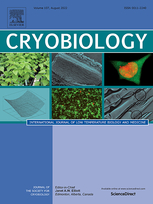
A comprehensive evaluation of the effects and mechanisms of antifreeze proteins during low-temperature preservation.
Author(s) : WANG J. H.
Type of article: Article
Summary
During the past 10 years, it has become clear that the effects of antifreeze proteins (AFPs) on cell viability and on thermodynamic properties during low-temperature preservation are complex. The paper reviews studies systematically. It is shown that AFPs can display both protective and cytotoxic actions and both nucleation of ice and inhibition of ice crystal growth, depending on several factors including the specific storage protocol, the dose and type of AFP, the composition and concentration of cryoprotectant, and the features of the biological material. A novel model is proposed to explain this dual effect of AFPs during cryopreservation. AFP-ice complexes have some affinity interactions with cell membranes and with many other molecules present in cryopreservation solutions. When the intensity of these interactions reaches a certain level, the AFP-ice complexes may aggregate, thereby inducing ice nucleation and loss of the ability to inhibit recrystallization.
Details
- Original title: A comprehensive evaluation of the effects and mechanisms of antifreeze proteins during low-temperature preservation.
- Record ID : 2001-2950
- Languages: English
- Source: Cryobiology - vol. 41 - n. 1
- Publication date: 2000/08
Links
See other articles in this issue (3)
See the source
-
The high viscosity encountered during freezing ...
- Author(s) : MORRIS G. J., GOODRICH M., ACTON E., et al.
- Date : 2006/06
- Languages : English
- Source: Cryobiology - vol. 52 - n. 3
View record
-
Ice nucleation in freeze-tolerant vertebrates.
- Author(s) : COSTANZO J. P., LEE R. E. Jr
- Date : 1996/03
- Languages : English
- Source: Cryo-Letters - vol. 17 - n. 2
View record
-
Abstracts of papers presented at the thirty-six...
- Date : 1999/12
- Languages : English
- Source: Cryobiology - vol. 39 - n. 4
View record
-
Isolation of ice-nucleating active bacteria fro...
- Author(s) : LEE M. R., LEE R. E., STRONG-GUNDERSON J. M., MINGES S. R.
- Date : 1995/08
- Languages : English
- Source: Cryobiology - vol. 32 - n. 4
View record
-
The use of cryopreservation in the ex-situ cons...
- Author(s) : SMITH D.
- Date : 1998/03
- Languages : English
- Source: Cryo-Letters - vol. 19 - n. 2
View record
